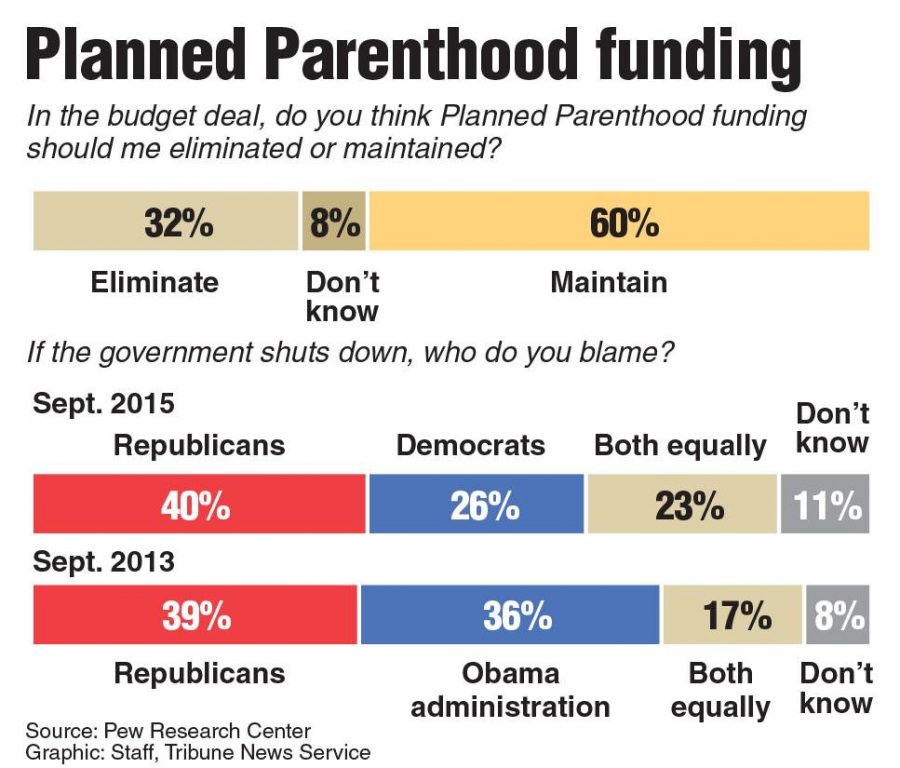Despite Tuesday’s heavy rain, nearly 200 pink-clad protesters wielding picket signs assembled Downtown in support of Planned Parenthood.
Protesters chanted about women’s right to control their own fates, demanding justice for the agency that does so much for so many. While the defunding controversy affects women across the nation, Pittsburghers get hit even harder.
Planned Parenthood receives its government funding from healthcare programs that target low- to middle-class families. Defunding Planned Parenthood would affect a large portion of Pittsburgh’s population. The city’s 27.9 percent poverty rate is higher than the national average of 20 percent, according to Brookings, a research organization based in Washington, D.C.
Single female-headed households in Pittsburgh are also three to four times more likely to live in poverty than the general population of the city, according to a report published in the Urban Institute. Further, this poverty reality disproportionately affects black women in Pittsburgh, who are three times more likely to head a single parent household than their white counterparts.
Pittsburgh’s Planned Parenthood — like all of its clinics — gives out free condoms to its clients and visitors and free birth control to those under 18. Both of these forms of contraception are essential, especially in Pennsylvania, where more than half of pregnancies are unplanned, according to the Guttmacher Institute.
Planned Parenthood’s provision of free condoms is especially important in a city like Pittsburgh, where a significant amount of residents suffer from HIV/AIDS. On average, there are 189 new cases of AIDS in Allegheny County each year. According to the Pittsburgh AIDS Center for Treatment, it is likely that 20 percent of those with AIDS in the county are yet to be diagnosed.
As Pittsburgh protesters gathered to defend Planned Parenthood, our government continued to use women’s reproductive rights as a pawn in its partisan war.
The Senate blocked legislation to freeze Planned Parenthood’s federal funding for a year, but a longer struggle could lie ahead. Several Republican representatives and senators have expressed their willingness to go to extreme measures — including a government shutdown — to defund the agency.
Although conservatives like to frame the defunding of Planned Parenthood as removing taxpayers’ money from “abortion factories,” as candidates like Donald Trump have put it, their statements misconstrue the government applies federal funds . Federal funding for Planned Parenthood comes from Title X and Medicaid, which means that Planned Parenthood cannot use the funds toward an abortion — except in extreme cases like rape, incest or medical necessity.
Instead, government funds go toward the agency’s other functions, which is what the vast majority of its clients visit Planned Parenthood for — only 3 percent of its services last year were abortion-related. The other 97 percent of what Planned Parenthood does goes toward addressing other integral women’s health issues, like breast cancer and STD testings.
“Planned Parenthood provides affordable health care to many people in the area, not just women,” Suzy Hinkle, the president of Pitt’s Campus Women’s Organization. “The defunding targets the poorer populations and cuts them off from health care.”
If the government strips Planned Parenthood is of its funding, it can no longer effectively serve as a hub of women’s health services.
This isn’t partisan politics playtime. It’s people’s health on the line.
Alyssa primarily writes on social justice and political issues for The Pitt News.
Write to her at aal43@pitt.edu.


